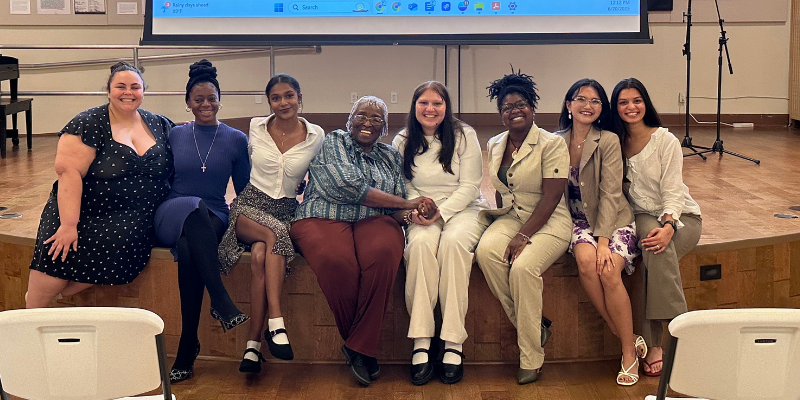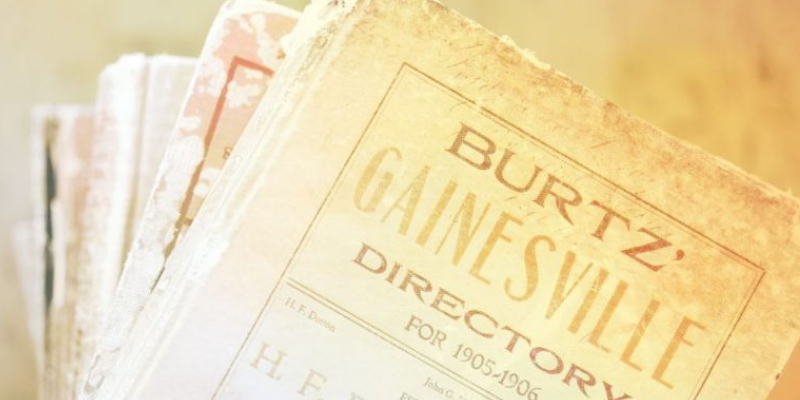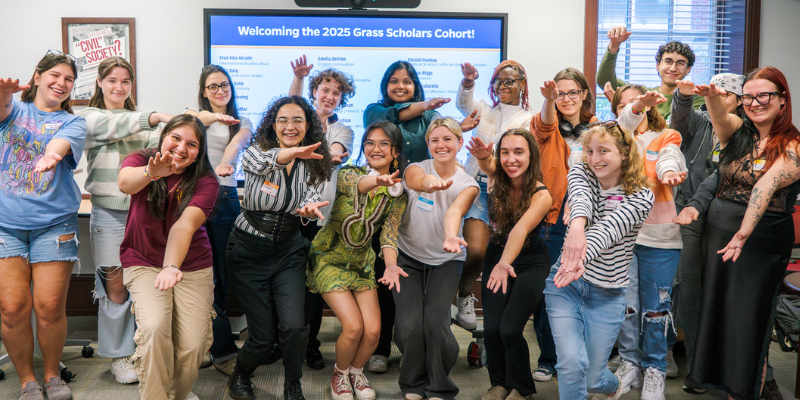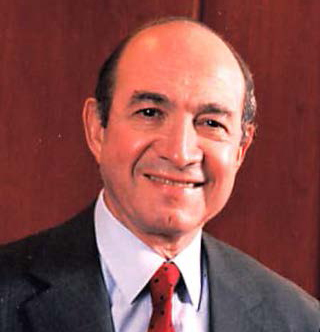Alexander Grass Scholars Program
Undergraduate Research with the Center for the Humanities and the Public Sphere


For questions about the program contact:
Alison Walsh, Grass Scholars Coordinator
humanities-center@ufl.edu
PROGRAM DESCRIPTION
The Center for the Humanities and the Public Sphere (CHPS) offers a funded undergraduate research program for students of all majors that emphasizes: academic inquiry in the humanities; experiential, project-based learning through community partnerships; and interdisciplinary, humanities-based research methods.
Students receive: $2000 total funding for 20 undergraduates in Summer A & Fall semester
Prerequisites: Undergrads at any level are eligible (graduating after December 2026)
All majors welcome, no research experience required
During Summer A, students will:
- Complete a course (IDS 4911, Monday-Friday 11-12:15)
- Work in small groups & collab w/partner organizations (see project descriptions below)
- Practice humanistic research methods
- Produce a digital project or public exhibit
During the Fall semester, students will:
- Work individually on an independent research project
- Collaborate with faculty mentors and graduate student mentors
- Present a research poster at a November symposium
Application deadline is Monday, February 23, 2026.
Click here to learn more and apply.
Register for the Zoom info session on Thursday, Feb. 12. | 1 – 2:30 p.m.
2026 Partner Organizations & Summer Projects

From Archive to Exhibit: Curating Voices from the Price Library of Judaica Latin American & Caribbean Collection
Partnering Organization:
Project Leader:
- Dr. Rebecca Jefferson (Curator, Isser and Rae Price Library of Judaica)
Description: This project will introduce Alexander Grass Scholars to archival research and exhibition curation using the Price Library of Judaica Latin American and Caribbean Collection. The collection contains documents related to Jews living in Latin American and Caribbean countries including Argentina, Bolivia, Brazil, Chile, Columbia, Cuba, Mexico, Peru, Uruguay, and Venezuela, particularly comprising documents related to those Jews who fled from Europe during and after World War II. Classes will be held in the library’s Judaica Suite, where students will gain hands-on experience working with archival materials. Students will learn how library professionals organize archives to facilitate research and how scholars analyze and interpret archival objects. They will also gain insights into methods of curating cultural heritage materials for public audiences. The students’ own research into the collection will culminate in a group-curated exhibition to be showcased at the entrance to the Judaica Suite.

Lessons That Last: The Legacy of Gloria Jean Merriex and Black Educational Leadership in Alachua County
Partnering Organizations:
Project Leader:
- Dr. Joni Perkins
Description: This project centers on the life, legacy, and educational impact of Gloria Jean Merriex—one of Florida’s most influential educators—and explores the broader role of Black educators and local historical figures in shaping public education in Alachua County. Students will engage in archival research, community oral histories, and media analysis, including collaboration with the director of the documentary “Class of Her Own.” The project will culminate in an interactive, traveling exhibit paired with educator-ready lesson plans designed for use in local schools and museums, offering students and teachers an accessible way to engage with local history, civic pride, and educational excellence.

The Business of Relaxation: Student Leisure in a Southern College Town
Partnering Organization:
Project Leader:
- Dr. Sean Adams (History, CLAS Dean’s Office)
Description: GNV Business History explores the experiences of business owners, managers, and family-run enterprises of Gainesville, Florida, starting from the late 19th century through the modern day. This project will focus on businesses that catered to UF students for leisure activities—restaurants, bars, pool halls, gyms, bowling alleys, etc.—and will involve a mix of oral history and traditional archival research to highlight those businesses over the years. The end result will be a standalone addition to GNV Business History’s digital reconstruction of the city’s economic and social landscape over the years.

Alachua County Healers Oral History Project: Sharing Stories of Care and Community
Partnering Organizations:
Project Leaders:
- Anna Hamilton, Samuel Proctor Oral History Program Assistant Director
Description: For this project, Grass Scholars will curate physical and digital exhibits for the Samuel Proctor Oral History Program’s new Alachua Healers Oral History Project, an interdisciplinary initiative documenting regional healing traditions. Grass Scholars will use newly recorded interviews, photographs, and archival ephemera to interpret local narratives of care, resilience, and community knowledge. Through guided research, exhibit design and construction, and public storytelling, students will gain hands-on experience in public history and community engagement while contributing to the preservation of North Central Florida’s varied healing traditions.
Program Updates
- 2025 Summer Partner Organizations & Projects
 In its second year the Grass Scholars Program brought together students, faculty, and community partners to explore the power of the humanities beyond the classroom. Through hands-on, interdisciplinary projects, scholars delved into local histories, languages, and cultural archives — transforming research into public engagement.
In its second year the Grass Scholars Program brought together students, faculty, and community partners to explore the power of the humanities beyond the classroom. Through hands-on, interdisciplinary projects, scholars delved into local histories, languages, and cultural archives — transforming research into public engagement. - Grass Scholars Uncover Truths Through Research and Public Engagement
 At the University of Florida, undergraduate students are taking the lead in innovative, community-engaged research across disciplines. Through research programs like Alexander Grass Scholars students explore pressing social and historical questions while gaining hands-on experience in the humanities.
At the University of Florida, undergraduate students are taking the lead in innovative, community-engaged research across disciplines. Through research programs like Alexander Grass Scholars students explore pressing social and historical questions while gaining hands-on experience in the humanities. - Introducing our 2025 Grass Scholars!
 This April, the Center for the Humanities and the Public Sphere welcomed its second cohort of the Alexander Grass Scholars Undergraduate Research Program, made possible by the generous support of ...
This April, the Center for the Humanities and the Public Sphere welcomed its second cohort of the Alexander Grass Scholars Undergraduate Research Program, made possible by the generous support of ...
Other Ways to Get Involved
Faculty Mentors
Faculty mentors play a key role in guiding Grass Scholars through their independent research journey, helping them refine their plans, overcome challenges, and maintain high standards of quality and integrity. $500 is awarded to faculty who supervise Grass Scholars within the program. This may be taken as a lump sum if faculty is on appointment (taxes will be deducted), or as professional development funds (held in a department account, taxes not deducted).
Community Partners
Our community partners—local organizations and cultural institutions—are vital spaces for Grass Scholars to explore the public humanities. Community partners that host a Grass Scholars Project are eligible for $500 in funding in exchange for hosting student projects, offering access to facilities, collections, and resources that support meaningful learning and collaboration.
Graduate Mentors
Graduate mentors are essential to the Grass Scholars program, providing guidance and expertise as students navigate group research projects in the summer and develop independent research in the fall. The AGS program provides $1000 total (summer A $500 and fall $500) for graduate supervision of five Grass Scholars students assigned to a specific project site.
About Alexander Grass

Alexander Grass (1927-2009) was an attorney, businessman, and founder of the Rite Aid Corporation, a major national retail drugstore chain. Mr. Grass completed his law degree at UF in 1949. Beyond his success in business, he is remembered for his commitment to community service and his generosity as a community philanthropist. Although Grass originally hailed from and operated his business in Pennsylvania, his generous support of UF’s campus, including the endowed chair in the Center for Jewish Studies, is a testament to the impact of his time as a student here. As noted in a 1997 interview (archived with UF’s Samuel Proctor Oral History Program), the humanities courses he completed at UF fostered an interest in the arts that continued throughout his life.
The Alexander Grass Scholars Program will allow the Center to directly involve undergraduate students in our mission to connect humanities research endeavors with the community where we live and teach. The Center for the Humanities and the Public Sphere is honored to be a part of his lasting legacy.
